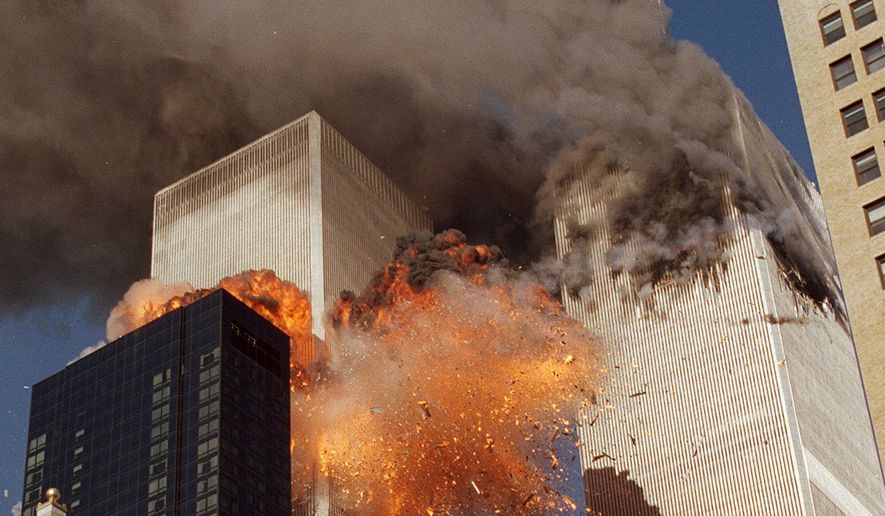The Justice Department released a report Tuesday that shows the death toll from 9/11 is still rising.
According to the September 11th Victim Compensation Fund’s 20th Anniversary Report, more than 3,900 claims have been filed on behalf of those who have died, allegedly as a result of attack-related ailments, in the 20 years since the 2001 plane hijackings. That count is on top of the 2,974 killed on the day of the attacks.
“The bottom line is 9/11 didn’t end on 9/11. And people do continue to get sick and die every day,” said Michael Barasch, a New York City lawyer who has helped thousands of 9/11 victims with health ailments register for the VCF.
The hijackers crashed four planes — two into the World Trade Centers, one into the Pentagon and one into a field in Pennsylvania — in the deadliest assault on U.S. soil in history, killing 2,750 in New York, 184 in the District and 40 in Pennsylvania.
Within two weeks of 9/11, Congress set up the VCF to help compensate those who were injured and the families of those killed in the attacks and the immediate aftermath.
Then-President George Bush signed off on the fund, saying the attacks would “not shut down our vital businesses or thwart our way of life.”
VCF initially closed in 2003 but was reopened by Congress in 2011 and the monetary benefits were expanded to those who responded to, cleaned up or lived near the attack sites. Then-President Barrack Obama reauthorized the VCF in 2015 and it was permanently authorized by Congress in 2019.
Since its establishment, the fund has received more than 67,000 claims and has awarded more than $8.9 billion to over 40,000 people. Nearly half of the recipients listed cancer as one of their eligible conditions.
A DOJ spokesperson said Tuesday that the VCF continues to receive claims at a “rapid” pace and it will be accepting submissions until 2090 “which basically means anyone who was alive at the time of the Sept. 11 attacks will be able to participate in the fund.”
The VCF estimates there are up to 650,000 people who were in areas affected by the attack.
Mr. Barasch said more and more people are signing up for VCF, but the challenge is letting people who weren’t first responders know that they can qualify for the funds as well. He added it’s easy for first responders to prove that they were at the scene of the 9/11 attacks, but more difficult for office workers and volunteers to do that since many of their former businesses closed.
Another concern of his is people missing health screenings during the COVID-19 pandemic that could detect cancers and illnesses linked to toxins from the 9/11 aftermath. People might also not connect the dots and realize that a health issue is tied to the World Trade Center toxins, he said, noting that the VCF can provide “enormous financial stability” for affected families.
Daniel Monte, a former government contractor who was working at the Pentagon when a plane struck it, was diagnosed with bladder cancer four or five years ago. The 76-year-old Florida resident said he also worked for an entire year rebuilding the Pentagon after the 9/11 attacks.
Now, years later, he has to receive three chemotherapy treatments each month for his bladder cancer and a yearly PET scan, which are covered by the VCF.
“A lot of the victims from 9/11 at the World Trade Center and the Pentagon have developed cancer,” he said. “You’ve got to take into consideration that at the Pentagon, you have lead, you have mold, you have asbestos, you have the jet fuel that was there at the time from the explosions and all of those chemicals that you ingest into your system. A lot of victims were getting diagnosed with some sort of cancer.”
Attorney General Merrick B. Garland said Tuesday that “we must never forget those lost and injured” and “we must also address the suffering that continues.”
“While no amount of money can erase the losses our nation endured on that day and in the years since, the [fund] is dedicated to providing compensation to those who continue to suffer as a result of the 9/11 attacks,” he said.
Mr. Monte said the image of the plane he witnessed hitting the Pentagon is embedded in his mind.
“I live with it every single day for the last 19 years,” he said. “I live with PTSD. I’ll never forget it.
“But I’m proud of what I did and I’m proud of the job that everybody did trying to get the Pentagon back on its feet,” he said. “I was at the wrong place at the wrong time, or I was either at the wrong place at the right time.”
• Shen Wu Tan can be reached at stan@washingtontimes.com.
• Emily Zantow can be reached at ezantow@washingtontimes.com.




Please read our comment policy before commenting.